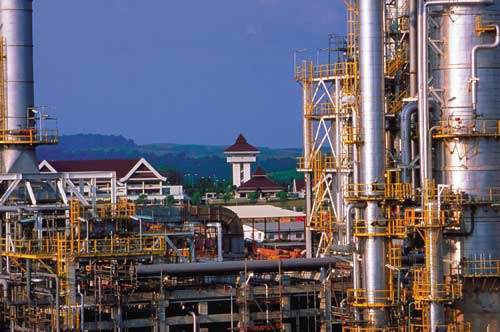
The new 100,000 bpd Melaka refinery known as PSR-2, is operated by the Malaysian Refining Corporation Sdn Bhd (MRC), a joint venture of Conoco (40%), Petronas of Malaysia (45%) and Statoil (15%). The refinery uses Conoco’s proprietary delayed coking technology to maximise production of diesel fuel, which is in high demand in the region. In July 2001 Petronas acquired an additional 8% equity in MRC, bringing total shares of MRC to 53%.
PSR-2 PROCESS UNITS
In addition to the hydrocracker, the project also required the construction of major PSR-2 process units. These include a 62,000 barrels/day vacuum distillation unit, a 26,000 barrels/day catalytic reformer, a 35,000 barrels/day desulfurization unit and a 21,000 barrels/day delayed coker, which will utilise Conoco’s proprietary petroleum coking technology.
The engineering, procurement, construction and commissioning (EPCC) contract for PSR-2 was awarded to a four-company consortium composed of Chiyoda Corporation, MMC Engineering Services, Chiyoda Malaysia and Mitsui & Co. LTD of Japan.
Conoco used its share of refined products from PSR-2, including LPG, a full range of gasolines, kerosene, jet-A1 and diesel, to supply the company’s existing and planned marketing operations in the region. The PSR-2 refinery will be built adjacent to the Petronas- owned PSR-1 refinery and the two refineries will share some common facilities.
MARKET RATIONALE
The refinery is the anchor for Conoco’s continued downstream growth in Asia Pacific and will ensure a supply of quality products to fuel the growth of Sime Conoco Energy in Malaysia and the continued expansion of Conoco’s marketing operations in Thailand.
Conoco will use its share of refined products produced by PSR-2 to support the company’s entry into Malaysia’s motor fuels retail market and the continued expansion of Conoco’s JET-branded retail marketing operations in Thailand.
PSR-2 is the first refinery in Southeast Asia to use Conoco’s proprietary delayed coking technology. This will allow PSR-2 to economically upgrade lower-valued, bottom-of-the-barrel feedstocks, to higher-valued liquid products.
MELAKA REFINERY PROJECT TIMESCALE
On November 9th 1994, following an 18 month feasibility study, Conoco and Petronas, agreed to construct and operate the Melaka refinery.
In January 1999 completion of the construction of a 28,500 barrels/day hydrocracker, meant that the crude oil refinery in Melaka, Malaysia was fully operational.
CONTRACTORS
On July 1,1993, MRC appointed Foster Wheeler (Malaysia) Sdn Bhd as Project Management Consultant (PMC) for the PSR-2 Stage 1 Project. Of the process units comprising the complex, Foster Wheeler provided the design for crude distillation, vacuum distillation, saturated gas recovery, amine regeneration (2 trains), sour water treatment (2 trains), hydrogen collection and distribution system, delayed coker light-ends, and a Foster Wheeler licensed hydrogen production unit.
Foster Wheeler ‘s scope of work, at the time of award, included:
Options that were later exercised by MRC at agreed take-up dates were:

